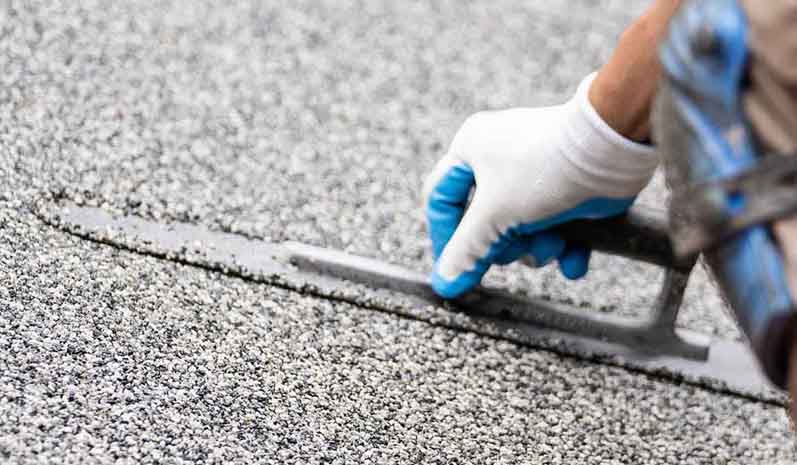Welcome to our blog post on permeable paving! If you're looking for an innovative and eco-friendly solution for your outdoor spaces, then you've come to the right place. Permeable paving is a game-changer in the world of construction and design, offering both functionality and sustainability.
What is permeable paving?
Welcome to our blog post on permeable paving! If you're looking for an innovative and eco-friendly solution for your outdoor spaces, then you've come to the right place. Permeable paving is a game-changer in the world of construction and design, offering both functionality and sustainability. Whether it's a driveway, patio, or walkway, this revolutionary technique allows water to seep through the surface instead of accumulating as runoff. In this article, we'll take a closer look at what exactly permeable paving is, how it works, its benefits, installation process, maintenance requirements, environmental impact, applications, and more. So, let's dive in and discover why permeable paving is rapidly gaining popularity among homeowners and environmental enthusiasts alike!
Definition of Permeable Paving
Permeable paving, also known as permeable pavement or porous paving, is a sustainable and environmentally friendly alternative to traditional impervious surfaces. Unlike conventional pavements that prevent water from penetrating the surface, permeable paving allows water to infiltrate through the material and into the ground below.
The concept behind permeable paving is simple: it aims to manage stormwater runoff by reducing its volume and improving water quality. By allowing rainwater to flow through the pavement instead of running off into drainage systems, permeable pavers help recharge groundwater supplies and reduce the risk of flooding in urban areas.
This innovative technique utilizes a combination of materials that are specifically designed to create voids or pores within the pavement system. These voids allow for effective infiltration of rainwater into underlying layers of soil, gravel, or stone reservoirs, where it can be naturally filtered and purified before reaching natural water sources such as rivers or lakes.
Permeable paving is not only functional but also aesthetically pleasing. With various options available in terms of colors, patterns, and textures, homeowners can choose a design that complements their overall landscaping theme while still enjoying all the benefits this eco-friendly solution has to offer.
Permeable paving offers an excellent way to tackle issues related to stormwater management while promoting sustainability in our built environment. Its ability to minimize runoff helps protect local ecosystems from pollution caused by excess nutrients and contaminants present in stormwater runoff. So whether you're looking for a driveway upgrade or planning your dream outdoor space makeover – consider opting for permeable pavers!
How Does Permeable Paving Work?
Permeable paving is an innovative solution that allows rainwater to permeate through the surface instead of running off. But how does it work?
At its core, permeable paving consists of a porous material, such as gravel or specially designed pavers, which are laid on top of a layer of aggregate and underlying soil. This combination creates an interconnected system of voids and channels that enable water to infiltrate into the ground below.
When rain falls onto permeable paving, it seeps through the small gaps between the particles or through the pores in the pavers themselves. The water then travels downward, gradually recharging groundwater supplies and replenishing nearby bodies of water like streams and rivers.
This natural drainage process helps prevent stormwater runoff from overwhelming drainage systems and causing flooding. It also filters out pollutants by trapping them within layers of stone or soil before they reach underground aquifers or nearby waterways.
By allowing rainwater to be absorbed into the ground rather than being lost to runoff, permeable paving reduces strain on municipal sewer systems during heavy rainfall events. It also helps to mitigate heat island effects by promoting evaporation and cooling surfaces naturally.
Whether it's for residential driveways, parking lots, walkways, or even sports fields, permeable pavement offers a sustainable alternative to traditional impermeable surfaces. Its ability to manage stormwater effectively while providing durability makes it an ideal choice for areas prone to heavy rains or limited green space.
So next time you see a paved surface that seems different from conventional asphalt or concrete – chances are it could be permeable paving at work!
Benefits of Permeable Paving
Permeable paving offers a range of benefits that make it an attractive choice for various applications. One key advantage is its ability to manage stormwater runoff effectively. Traditional paved surfaces can result in excessive water pooling and runoff, leading to erosion and pollution of nearby water bodies. With permeable paving, rainwater can infiltrate through the surface, reducing the risk of flooding and allowing for natural groundwater recharge.
Another benefit of permeable paving is its contribution to improved water quality. As rainwater passes through the porous material, it undergoes filtration that helps remove pollutants and contaminants. This helps protect local ecosystems by preventing harmful substances from entering streams, rivers, or lakes.
Furthermore, permeable paving can help mitigate the urban heat island effect. Unlike traditional asphalt or concrete surfaces, which absorb heat and radiate it back into the environment, permeable pavements have a cooler surface temperature due to their ability to allow air circulation beneath them. This can contribute to more comfortable outdoor spaces and reduce energy consumption associated with cooling buildings in hot climates.
Additionally, permeable paving promotes sustainability by reducing reliance on more resource-intensive construction materials such as asphalt or concrete. The use of recycled materials in some types of permeable pavement further adds to its eco-friendly credentials.
One cannot overlook the aesthetic appeal that permeability brings to outdoor spaces. Permeable pavers are available in various colors, shapes, and sizes, which can be creatively combined for visually appealing designs that enhance curb appeal while also providing practical functionality.
In summary - without using those words! - incorporating permeable paving into your project provides numerous benefits, including effective stormwater management, improved water quality protection against pollutants, mitigation of the urban heat island effect, creation of cooler environments, sustainable construction practices, recycled materials when possible, and enhanced aesthetics with a variety of design options available.
Types of Permeable Paving Materials
When it comes to permeable paving, several types of materials can be used to create a functional and visually appealing surface. Each type has its unique characteristics and benefits, allowing property owners to choose the option that best suits their needs.
One popular choice for permeable paving is porous asphalt. This material consists of regular asphalt mixed with aggregate and a binding agent, which creates small voids that allow water to pass through. Porous asphalt is durable and can withstand heavy traffic, making it ideal for driveways or parking lots.
Another option is pervious concrete, which is made by reducing the amount of sand in the mixture and increasing the amount of coarse aggregate. This creates larger void spaces within the concrete, allowing water to infiltrate through. Pervious concrete is strong and durable while still providing excellent drainage capabilities.
Grass pavers are another type of permeable paving material that combines grass with a plastic grid system. The grids provide structural support while allowing grass to grow through them. Grass pavers are aesthetically pleasing and provide effective stormwater management.
Permeable interlocking concrete pavers (PICP) are yet another option for creating permeable surfaces. These pavers have specially designed joints that allow water to flow between them into a base layer where it can be stored or infiltrated into the ground below.
These are just a few examples of the many types of porous paving materials available today. Whether you're looking for durability, aesthetics, or environmental benefits, there's sure to be an option that meets your specific needs!
Installation Process and Cost
When it comes to installing permeable paving, the process can vary depending on the specific material being used. However, some general steps are typically followed.
First, the area where the paving will be installed needs to be prepared. This involves clearing away any existing vegetation or debris and ensuring that the ground is level and stable.
Next, a layer of aggregate is usually laid down as a base. This helps with drainage and provides a solid foundation for the paving material.
Once the base is in place, the permeable pavers or blocks are then laid out according to the desired pattern or design. Care must be taken during this step to ensure proper alignment and spacing between each piece.
Jointing sand or gravel may be brushed into the gaps between the pavers to provide stability and further enhance drainage capabilities.
As for cost, it can vary depending on factors such as location, size of the area being paved, choice of material, and complexity of installation. Generally speaking, though, permeable paving is more expensive upfront compared to traditional impervious surfaces like concrete or asphalt. However, considering its long-term benefits in terms of water management and environmental impact reduction,
it's an investment worth considering for those who prioritize sustainability in their landscaping projects.
Maintenance and Longevity
Maintaining permeable paving is relatively simple, requiring regular inspections and minimal upkeep. One of the main advantages of this type of pavement is its ability to self-cleanse. Rainwater naturally flushes out debris, preventing the buildup of pollutants and reducing the need for manual cleaning.
However, periodic maintenance may still be necessary to ensure optimal performance. This can include removing any accumulated sediment or organic matter from the surface. Mechanical sweepers or pressure washers can be used for more thorough cleanings if needed.
In terms of longevity, permeable paving is designed to last for many years with proper care. The durability and strength of these materials make them highly resistant to cracking and shifting under heavy loads or extreme weather conditions.
Regular inspections should be conducted to identify any signs of damage or wear. Any cracks or gaps should be promptly repaired to prevent water infiltration and maintain the effectiveness of the system.
By following these maintenance practices, permeable paving can provide a long-lasting solution that not only benefits the environment but also ensures reliable functionality for years to come.
Environmental Impact of Permeable Paving
Permeable paving not only offers a range of practical benefits, but it also has a positive impact on the environment. One major advantage is its ability to reduce stormwater runoff. Traditional pavement surfaces can cause rainwater to collect and flow into drains, potentially overwhelming sewer systems and causing pollution as it carries contaminants into water bodies.
With permeable paving, rainwater can infiltrate through the surface and naturally filter into the ground below. This process helps recharge groundwater supplies and reduces strain on drainage infrastructure. It also allows for the natural filtration of pollutants before they reach waterways, improving overall water quality.
Furthermore, permeable paving can help mitigate the urban heat island effect by reducing surface temperatures. Traditional pavements absorb heat from the sun's rays during hot weather, leading to increased air temperatures in built-up areas. In contrast, porous surfaces allow excess heat to dissipate more efficiently.
Additionally, because permeable paving materials are often made from recycled or locally sourced materials such as crushed stone or porous concrete mixtures, their production has a lower carbon footprint compared to traditional asphalt or concrete options.
Choosing permeable paving for driveways or other applications contributes positively toward sustainability goals by promoting better stormwater management practices and minimizing environmental impact.
Applications for Permeable Paving
Permeable paving has a wide range of applications, making it a versatile solution for various outdoor spaces. One common use is in driveways, where permeable pavers can replace traditional concrete or asphalt surfaces. By allowing water to pass through the surface and into the ground below, permeable paving helps to prevent runoff and reduce flooding.
In addition to driveways, permeable paving can also be used in parking lots. This not only helps with stormwater management but also reduces heat island effects by allowing rainwater to infiltrate into the soil naturally.
Another application for permeable paving is in walkways and patios. The porous nature of these materials allows water to seep through, preventing puddles from forming and improving safety during wet weather conditions.
Permeable paving can even be utilized in commercial settings such as plazas or public squares. Along with its functional benefits, the aesthetic appeal of permeable pavers adds an attractive touch to any outdoor space.
Whether it's a residential driveway or a large-scale development project, permeable paving offers a sustainable solution that combines functionality and visual appeal. Its versatility makes it suitable for various applications throughout different environments.
Conclusion
Permeable paving is a groundbreaking solution for sustainable and eco-friendly construction projects. With its ability to allow water to infiltrate the ground, it helps alleviate stormwater runoff, reduce flooding risks, and improve water quality. Additionally, permeable paving offers numerous benefits, such as enhanced aesthetics, durability, and versatility.
There are various types of permeable paving materials available in the market today, including pervious concrete, porous asphalt, and interlocking pavers. Each material has its unique characteristics and advantages depending on the specific project requirements.
The installation process of permeable paving involves proper site preparation and careful placement of the chosen material. While costs may vary depending on factors such as material choice and project size, investing in permeable pavement can lead to long-term savings by reducing maintenance needs and minimizing environmental impacts.
Speaking of maintenance, regular cleaning is essential to ensure the optimal performance of the permeable pavement. This typically involves removing debris from the surface using a broom or vacuuming equipment. With proper care and maintenance practices in place, your permeable pavement can last for several decades without compromising its functionality.
From residential driveways to commercial parking lots and public walkways, there are countless applications for permeable paving across different contexts. It provides an effective solution that combines functionality with sustainability while enhancing outdoor spaces with visually appealing designs.
When it comes to environmental impact, choosing permeable paving over traditional impervious surfaces significantly reduces stormwater runoff volume while promoting groundwater recharge. By allowing rainwater to naturally percolate into the ground rather than being diverted into drainage systems or causing erosion issues elsewhere,
In conclusion, profitability is not just another buzzword; it's a vital aspect of responsible urban planning that ensures our communities remain resilient against climate change impacts. Permeable paving offers a practical way forward by mitigating flood risks while preserving our precious water resources.
Why not opt for this innovative approach when considering your next construction project? Embrace the future of sustainable infrastructure with permeable paving and make a positive impact on the environment.




